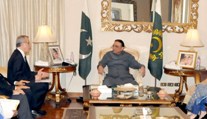 Dr Ala Alwan, WHO Regional Director, meets with H.E. the President Asif Ali Zardari to discuss some of the challenges facing Pakistan's national polio programmeIn his recent visit to Pakistan, WHO Regional Director for the Eastern Mediterranean Dr Ala Alwan met H.E. the President Asif Ali Zardari to discuss the progress of, and challenges to, Pakistan’s national polio programme.
Dr Ala Alwan, WHO Regional Director, meets with H.E. the President Asif Ali Zardari to discuss some of the challenges facing Pakistan's national polio programmeIn his recent visit to Pakistan, WHO Regional Director for the Eastern Mediterranean Dr Ala Alwan met H.E. the President Asif Ali Zardari to discuss the progress of, and challenges to, Pakistan’s national polio programme.
The President condemned the two recent incidents in Karachi, in which a local polio eradication worker was shot and killed and two WHO staff, supporting the implementation and monitoring of a vaccination campaign, were injured.
He reiterated the commitment of the Government of Pakistan to provide security to local and international health workers and said that the Government of Sindh had been directed to take strict action against those involved in the attacks. A joint interrogation team has been constituted to investigate these incidents and bring those responsible to justice.
The President commended the polio eradication efforts and contributions of national and international partners, including WHO.
Dr Alwan expressed appreciation at the clear statements of commitment of the Government of Pakistan to address the challenges facing polio eradication efforts in poliovirus transmission zones and provide adequate security to all those working to eradicate the disease from the country.
While the financial contributions of provincial governments have been commended, the Federal Government has been urged to make additional substantial financial contributions, similar to those made by the Governments of India and Nigeria. Dr Alwan informed the President that he was encouraged by the growing interest among countries of the Organization of Islamic Cooperation to support polio eradication activities in Pakistan and Afghanistan through the Islamic Development Bank.
During the fourth meeting of the National Task Force on Polio Eradication in Pakistan, chaired by the Prime Minister H.E. Raja Pervez Ashraf, Dr Alwan acknowledged the strong efforts of the federal and provincial governments and the dynamic support of the Prime Minister’s Focal Person for Polio Eradication and the Chair of the Polio Oversight Committee. He acknowledged, in particular, the leadership of the Deputy Commissioners and the hard work of medical officers and vaccinators in improving the quality of polio eradication campaigns at the district andunion council levels.
The Regional Director said he was encouraged by the decreasing number of polio cases in the country. He noted that although the remarkable efforts of the provincial administrative leadership had resulted in recent gains, security challenges and logistical and managerial weaknesses were currently endangering these gains.
While continuing its support to polio eradication in the country, WHO has raised the alarm over the situation in north and south Waziristan where a locally announced ban on vaccination has put more than 200 000 children at immediate and escalating risk of polio. If not addressed, WHO warns that this ban will seriously jeopardize the efforts of the Government of Pakistan and partner organizations in eradicating polio.


